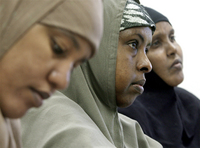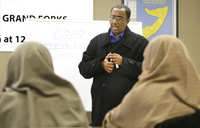Two centers for African immigrants open in Grand Forks.

By: Chuck Haga, Grand Forks Herald
Thursday, March 04, 2010

Somali refugees (left to right) Raani Gedow, Sadiyo Giire and Amina Jama listen as Mohamed Ismail teaches an English class Wednesday morning at the Somali Community Center in Grand Forks. (Sarah Kolberg, staff photographer) |
With the urgent intensity of a general in the field, Mohamed Ismail maneuvers easily from Somali to English and back to Somali as he reviews the day’s assignments: nouns, common (as in “city” and “country”), and nouns, proper (as in “Grand Forks” and “United States”).
He runs through the intricacies of English pronouns, too, and their baffling verbs.
“I am, you are, he is …”
Nine Somali men and women, recent arrivals to Grand Forks, scratch away at notepads as they try out the new sounds, some with more luck than others.
They are gathered this chilly March morning in a sparsely furnished room decorated only with a proud banner and a map of their benighted homeland in the Horn of Africa. This collection of folding chairs and tables and white boards littered with nouns and verbs is the Somali Community Center of Grand Forks, the banner proclaims: a place of learning and assistance for the 300 to 400 members of a growing Somali population here.
Most are refugees from war and the breakdown of civil authority in Somalia. Many spent years in crowded camps in neighboring Kenya before winning permission to come to America. Some came to Grand Forks as refugees from violence in Minneapolis and other large American cities.
But even here, divisions seem to hamper the Somali people.
To the cheers of public officials and other supporters, Ismail’s center opened in January.
Just two weeks earlier, city officials and representatives of social agencies participated in another grand opening less than a mile away, at the one-room African Community Service — where Somali-born Kowsar Shafie offers similar assistance to immigrants.
She opened her office despite discouragement from some in the Somali community.
“There are Somali guys who think I’m not capable of doing it because I am a woman,” she said. “But I am a strong, educated woman, and no one can tell me what to do — or what not to do.”
Ismail said the rival community centers have nothing to do with gender or with old clan rivalries.
“We are all Somalis,” he said. “But she lacks the experience to do this. She lacks the qualifications to teach. The elders of our community, women and men, came to me and urged me to do this.”
A long journey

Mohamed Ismail, a Somali refugee who came to the United States in 1998, teaches an English class at the Somali Community Center in Grand Forks Wednesday morning. Ismail's center opened in January just weeks after another refugee center, the African Community Service, opened less than a mile away. (John Stenns, staff photographer) |
Ismail was a teacher in Somalia before the country began its disintegration into clan warfare in 1991.
“It was chaos, fighting everywhere,” he said.
He spent three years in a refugee camp in Kenya, then four years in Yemen, where he managed a community center and school. In 1998, he won a visa lottery and was allowed to come to the United States.
He worked for five years as a security guard in Minneapolis before enrolling at St. Cloud State University in 2006, earning a degree in finance in 2008. Last year, he came to Grand Forks to enroll in graduate school at UND, seeking a master’s degree in business administration.
As he works on the degree, “I want to help this community and make this a better community,” he said. “I want to help people learn the language, learn basic math — the skills that employers want. We will teach driving, too, and how to fill out forms.”
Some of the Somali people who have come to Grand Forks are illiterate and must start first with learning the Somali alphabet, Ismail said.
“English is very different,” he said. “It is hard for us. But the people want to become independent, to be able to apply for work.”
Goal: Citizenship
Hal Gershman, president of the Grand Forks City Council, said both Somali initiatives are positive.
“Maybe each has its own place,” he said. “And it should be for them to work out the best ways to work toward the main objective, which is citizenship.”
The city is forming a committee to encourage civic engagement by refugees and other immigrants, a U.S. League of Cities pilot project. “We hope within that to develop a citizenship academy that can teach people how city hall works, how our health department works and how they can become leaders through active participation,” Gershman said.
Pat Berger, director of the Grand Forks United Way, said her agency donated a computer to the Somali Community Center and is considering a community impact grant request.
The center is affiliated with an established Minnesota Somali organization that has 501c tax-exempt status.
“We would love at some point, as a city, that the groups work together,” Berger said. “But their focus tends to be different. She is working more one-on-one with families to help them through the process of various assistance programs. She’s providing a lot of translation help, driving people to appointments,” while the emphasis at the other center has been more on the teaching of English.
‘Make us a family’
Kowsar, who has been in the U.S. since 2001, works 12-hour shifts Saturdays and Sundays as a certified nursing assistant at Altru Hospital. She staffs her office Monday through Friday.
“Mondays are hard, but I enjoy it,” she said this week. “If I help one person, it makes my day.”
She has submitted an application for status as a tax-exempt nonprofit, which would make her eligible to receive tax-deductible donations. She has received some help through other social service agencies but still needs furniture and equipment.
Her office has provided assistance to people from Sudan, Liberia and other African countries, but the local Somali population is the largest by far from that part of the world. Some Somalis, mostly women and children, have come to her for help.
“Others … don’t want me to be successful,” she said. “They think I’m not capable of doing this work. I should be staying home and minding my own business.
“But that’s not what this is about. This is about trying to help people. My goal is to make Grand Forks a better community, to make us a family.
“It’s not just Somalis who live in Grand Forks. We have people from Nigeria, Liberia, Ghana. I want them to feel welcome, too.”
Reach Haga at (701) 780-1102 ; (800) 477-6572 , ext. 102; or send e-mail to [email protected].